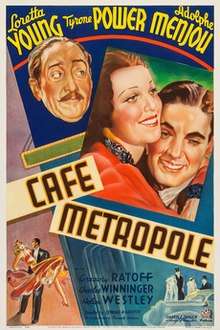Cafe Metropole
Cafe Metropole is a 1937 American romantic comedy film directed by Edward H. Griffith, released by 20th Century Fox and starring Loretta Young, Tyrone Power and Adolphe Menjou.
| Cafe Metropole | |
|---|---|
 Theatrical release poster | |
| Directed by | Edward H. Griffith |
| Produced by | Darryl F. Zanuck Nunnally Johnson (assoc. producer) |
| Screenplay by | Jacques Deval |
| Based on | a story by Gregory Ratoff |
| Starring | Loretta Young Tyrone Power Adolphe Menjou |
| Music by | David Buttolph Cyril J. Mockridge |
| Cinematography | Lucien N. Andriot |
| Edited by | Irene Morra |
| Distributed by | Twentieth Century Fox Film Corporation |
Release date |
|
Running time | 83 minutes |
| Country | United States |
| Language | English |
Plot
Victor Lobard (Adolphe Menjou) owns the very exclusive Cafe Metropole In Paris. One night, he has to get drunken American Alexander Brown (Tyrone Power) to leave after closing time. Then he is visited by a distraught Maxl Schinner. Maxl loaned him 900,000 francs (which he embezzled), and Victor has not repaid anything. Victor asks for another 60,000 francs and promises to repay everything at 6 o'clock the next evening. Maxl gives him the money.
Victor risks the 60,000 francs at baccarat and wins 420,000 more. Alexander wagers the full amount against him, but loses. Victor seemingly has the money he needs, but then Brown confesses he is penniless. Victor coerces Alexander into posing as a Russian nobleman, Prince Alexis Paneiev, and wooing heiress Laura Ridgeway (Loretta Young), the daughter of an old friend of Victor's, so that Victor can get his hands on the girl's money.
"Alexis" shows up early at the cafe and goes to the Metropole's florist's shop for a boutonnière. There he is mistaken by Laura for an employee; "Alexis" is enchanted, without knowing who she is. When Laura joins her father at their table, she asks Victor to steer some celebrities or royalty her way. Then, "Alexis" makes his entrance and is greeted by Victor as "your highness", much to Laura's embarrassment. Victor manages it so that "Alexis" dances with Laura. They get along wonderfully. However, there is a complication. "Alexis" is called away by a waiter to answer a telephone call. There is no call: the waiter turns out to be the real Alexis Paneiev! Victor manages to soothe his outraged honor and obtain his silence for 50,000 francs.
Alexander is in love with Laura, so he tries to discourage her love for him, without revealing the sordid details, without much luck. He tells Victor that he will tell her the truth, but when she telephones and asks him to marry her, he at last says yes. Victor has his lawyer Monnet present Alexander with a contract, asking for money from Laura's father, Joseph Ridgeway: half a million dollars before the wedding, and the same amount after, as well as various sums for any children. This so disgusts Alexander that he tells Victor that he is through with the scheme; Victor, after trying to bluff him into submission, pretends to give up and gives him back his passport and his bad check. Then Victor tells Ridgeway that "Alexis" is a fraud. He cons Ridgeway into believing he bought "Alexis" off; Ridgeway writes him a check for a million francs.
Ridgeway tells Laura the news, but she surprises him by saying she knew all along. However, when he states that he bought "Alexis" off, Laura does not believe him. She is certain that "Alexis" is in trouble and insists on finding out what is going on.
Ridgeway asks the Sûreté to arrest "Alexis". Instead, they jail the genuine prince. When Laura goes to the jail to see her "Alexis", she is surprised to find an older man, who reveals that Victor is involved somehow. As Laura is leaving, she finds "Alexis", or rather Alexander, being charged with fraud. Everything is eventually straightened out, and the happy couple are reunited.
Cast
- Loretta Young as Laura Ridgeway
- Tyrone Power as Alexis
- Adolphe Menjou as Monsieur Victor
- Gregory Ratoff as Paul
- Charles Winninger as Joseph Ridgeway
- Helen Westley as Margaret Ridgeway
- Christian Rub as Maxl Schinner
- Ferdinand Gottschalk as Monsieur Leon Monnet
- Georges Renavent as Captain
- Leonid Kinskey as Artist
- Paul Porcasi as Police Official
- André Cheron as Croupier (as Andre Cheron)
- George Beranger as Hat Clerk (as Andre Beranger)
Reception
Frank Nugent gave it a lukewarm review in The New York Times, writing that "its plot has a warmed-over look about it ... Yet, it comes pleasantly seasoned with comedy and it has been served with a modest flourish or two".[1] "The Rivoli [movie theater] has given us much worse, and much better."[1]
References
- Frank Nugent (April 29, 1937). "THE SCREEN; ' Cafe Metropole,' a Light Comedy With Tyrone Power and Loretta Young Is Shown at the Rivoli". The New York Times.